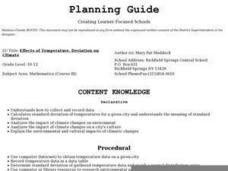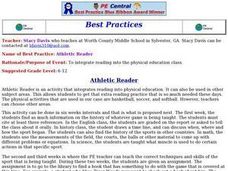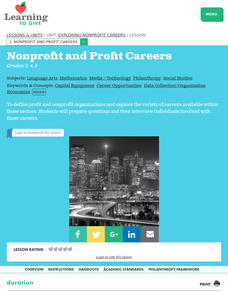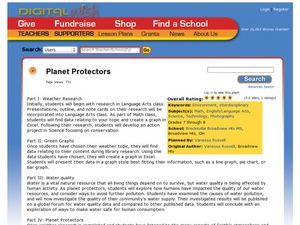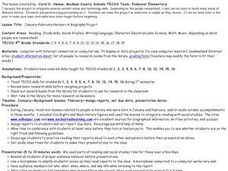Curated OER
It All Adds Up
Students brainstorm reasons for politicians to expand recycling programs and find statistics to support recycling programs. They design posters, displaying a compelling statistic about recycling, to convince students at their school to...
Curated OER
Why We Trade: Exchanging Goods and Services
Students conduct simple bartering and trading activities and consider how product value can be altered by the market.
Curated OER
Effects of Temperature, Deviation on Climate
Young scholars collect and record data for a given city. They calculate standard deviation of temperature and analyze the impact of climate changes on a city's and culture.
Curated OER
Current Currencies
Young scholars explore the nature of money. They view how monetary systems evolved. They examine how different cultures value money and how foreign exchange rates work. Charting currency exchange rates begin.
Curated OER
Rock-A-Bye Pendulum
Third graders use the scientific process to explore the effects of force on an object in motion. They demonstrate that the greater the force applied to an object, the greater the change in speed or direction of the object. They...
Curated OER
The Fuelish Fact Finding
Students define fluctuation and the price of food. In this algebra lesson, students create a budget to live on based on their living expenses. They create a chart and explore the cause and effect of real life scenarios.
Curated OER
Behold the Wonder of Creation
Fifth graders explore and become familiar with U.S. National Parks. They research several parks and compile the information they find into a spreadsheet. They plan and write a report/booklet about one of the U.S. National parks.
Curated OER
Life on the Edge
Students participate in a variety of activities about endangered animals. They read books, watch videos, and, in pairs, choose an endangered animal to research. They create a 2 slide presentation to be compiled into a class slide show.
Curated OER
Disease & Epidemics
Pupils investigate diseases and epidemics from a biological and social perspective. They analyze the management of disease, use and misuse of antibiotics and vaccinations, and development of new treatments.
Curated OER
Environmental Education/Water Pollution
Fifth graders play a game in which they list as many environmental issues or terms in alphabetical order. They brainstorm ways they can save the environment and create a mural that displayed research found from the internet and Encarta.
Curated OER
Athletic Reader
Students research the history of the sport they are participating in. They conduct research and write a report, create a timeline of the sport, and investigate the history of the sport in other countries. Students then observe and...
Curated OER
Nonprofit and Profit Careers
Students examine the difference between profit and nonprofit organizations. They identify careers that are available in each sector as well. They develop their own questions and interview people who are in those careers.
Curated OER
Geometry: Classifying Angles
Learners measure, construct, and classify angles as acute, right, straight, and obtuse. Once they have completed an angle worksheet, students use a map of South Carolina to locate cities by constructing the aforementioned angles.
Curated OER
Your Next Class Trip
Students write a persuasive argument to their principal to take their class trip to a destination of their choice. They must transfer the written argument into a website. They also focus on what it takes to plan a trip.
Curated OER
Using an Amortization Table
Students search the Internet to find a site that contains an amortization table and make a hypothesis about the results of changing time and rate. They examine the affects of time and rate on a mortgage and discuss the difference in the...
Curated OER
Chuck Close Up Close
Students practice the art of storytelling using realistic art. They pick one illustration of a character in the book and create a story about the possible life he lived. The important details that are needed is the name, occupation,...
Curated OER
The Young Basketball Player
Students explore the history of basketball by reading and listening to a book entitled, "The Young Basketball Player." Afterwards, they create a trivia basketball game and write an interview for their favorite player. As a...
Curated OER
Attributes of Renewable Energy: From Nanopossibilities to Solar Power
High schoolers explore solar energy, why we use it and how we use it. In this renewable energy lesson students compare active and solar techniques.
Curated OER
Transportation Systems: Two Liter Boat Activity
High schoolers design and build full-size boats made out of two-liter plastic bottles, chicken wire, and plywood. Then they race the boats, with the boat's designers "manning the hull", in the school's swimming pool.
Curated OER
Planet Protectors
Students explore ways to protect the earth. In this environmental issues and technology activity, students investigate the water quality in their community and compare their findings to the water quality in other geographic areas. ...
Curated OER
Measuring Animal Sizes (and Relative Sizes in our Animal Environment)
Young scholars discover the actual size and weight of many insects and animals. In this biology lesson, students investigate animals and insects to determine their actual weight and size. In groups, young scholars create an animal or...
Curated OER
A Hero Biography Project
Fourth graders study historical significant people born in January and February and note their accomplishments. Using given websites, 4th graders collect biographical information and participate in activities about a specified hero. ...
Curated OER
Your Role as a Taxpayer: Why Pay Taxes?
Students evaluate the basic rationale, nature, and consequences fo taxes. They describe why governments need taxes as revenue to provide goods and servicesin this series of activities.
Curated OER
Take Two and Call Me in the Morning
Eighth graders are introduced to the workings of the major systems of the Human Body: circulatory, digestive, respiratory, nervous, skeletal, and endocrine Systems. They learn the major organs of the systems and their functions.




